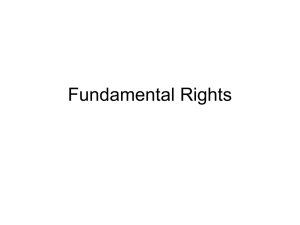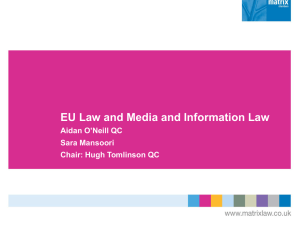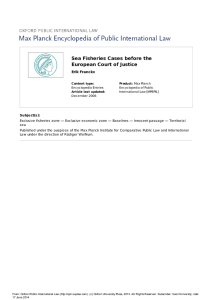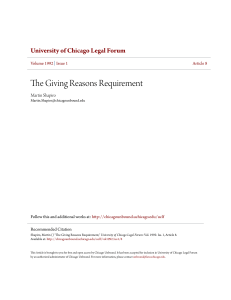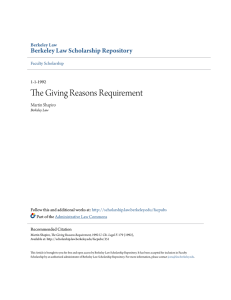THE CASTAN CENTRE FOR HUMAN RIGHTS the UK
advertisement
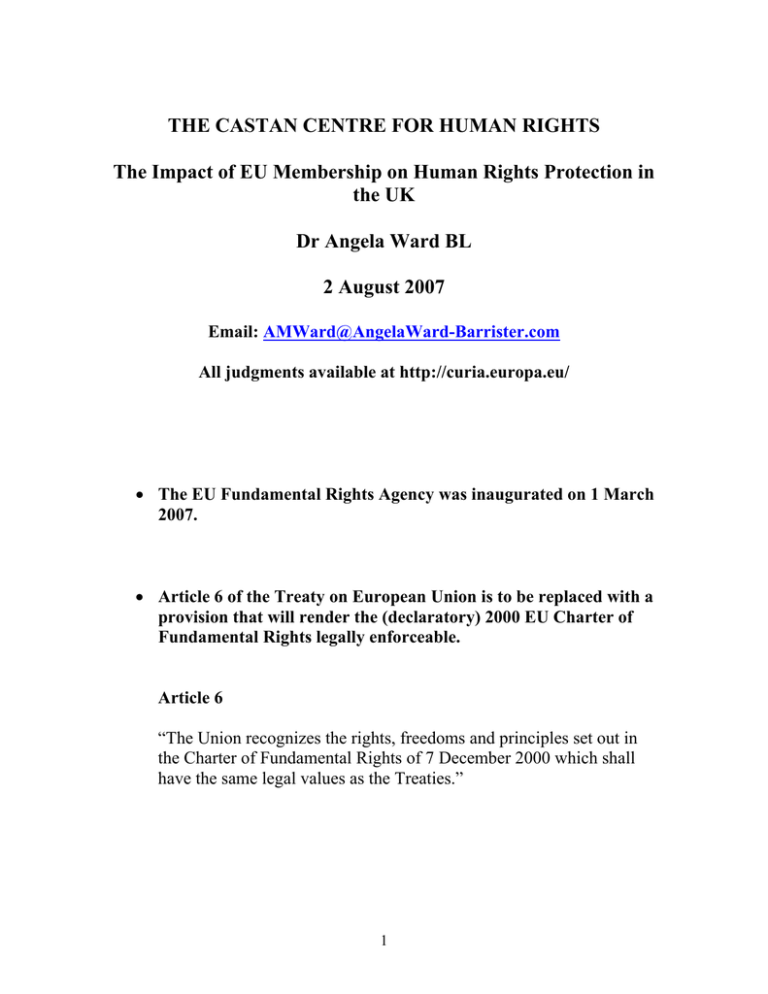
THE CASTAN CENTRE FOR HUMAN RIGHTS The Impact of EU Membership on Human Rights Protection in the UK Dr Angela Ward BL 2 August 2007 Email: AMWard@AngelaWard-Barrister.com All judgments available at http://curia.europa.eu/ • The EU Fundamental Rights Agency was inaugurated on 1 March 2007. • Article 6 of the Treaty on European Union is to be replaced with a provision that will render the (declaratory) 2000 EU Charter of Fundamental Rights legally enforceable. Article 6 “The Union recognizes the rights, freedoms and principles set out in the Charter of Fundamental Rights of 7 December 2000 which shall have the same legal values as the Treaties.” 1 • But compare the UK Protocol. Article 1 1. The Charter does not extend the ability of the Court of Justice [in Luxembourg], or any court or tribunal of the United Kingdom, to find that the laws, regulations or administrative provisions, practices or action of the United Kingdom are inconsistent with the fundamental rights, freedoms and principles that it reaffirms (emphasis added). 2. In particular, and for the avoidance of doubt, nothing in [Title IV] of the Charter creates justiciable rights applicable to the United Kingdom except in so far as the United Kingdom has provided for such rights in its national law (emphasis added). Article 2 To the extent that a provision of the Charter refers to national laws and practices, it shall only apply in the United Kingdom to the extent that the rights or principles that it contains are recognised in the law or practices of the United Kingdom (emphasis added). • So why the UK reticence? (i) Fundamental Rights case law of the European Court of Justice (the ECJ) became part of UK law with the entry into force of the European Communities Act 1972. 2. - (1) All such rights, powers, liabilities, obligations and restrictions from time to time created or arising by or under the Treaties, and all such remedies and procedures from time to time provided for by or under the Treaties, as in accordance with the Treaties are without further enactment to be given legal effect or used in the United Kingdom, shall be recognised and available in law, and be enforced, allowed and followed accordingly; and the expression "enforceable Community right" and similar expressions shall be read as referring to one to which this subsection applies (emphasis added). 2 (ii) How did the ECJ come to have jurisdiction over fundamental rights at all? - This occurred as a function of the primacy of EC law over conflicting national measures, as established in cases sent by national courts to the ECJ under Article 234 of the EC Treaty. Eg Case 26/62 van Gend en Loos [1963] ECR 1 “the Community constitutes a new legal order of international law for the benefit of which states have limited their sovereign rights, albeit within limited fields, and the subjects of which comprise not only the Member States but also their nationals. Independently of the legislation of Member States, Community law therefore not only imposes obligations on individuals, but is also intended to confer upon them rights which become part of their legal heritage”. - It later followed that such “primary” EC measures had to be read subject to “implied” EC fundamental rights, as reflected in the legal traditions common to the Member States, and international human rights conventions with which the Member States have collaborated. Eg Case 11/70 Internationale Handelsgesellschaft v. Einfuhr-und Vorratstelle für Getreide und Futtermittel [1970] ECR 1125 • Examples of leading UK Fundamental Rights cases decided under the Article 234 reference mechanism. Case 222/1984 Johnston v. RUC [1986] ECR 1651 Case C-60/00 Mary Carpenter v. Secretary of State for the Home Department [2002] I ECR 6 279 Joined Cases C-20 and C-64/00 Booker Acquaculture Ltd v. The Scottish Ministers [2003] ECR I – 7 411 3 • Specific features of ECJ fundamental rights case law. - Until the advent of the 2000 (declaratory) charter, the content of EU fundamental rights was notoriously uncertain, due to their implied nature. But they are broader in scope than the ECHR. - However, United Kingdom judges were bound to enforce them, due to section 2 (1) of the European Communities Act 1972. - Remedial powers and duties of Member State judges are much broader. They include; (a) a duty to disapply all national measures that are inconsistent with fundamental rights – i.e. a strike down power; (b) a duty to recraft national procedural law if it obstructs enforcement of fundamental rights; (c) a duty to create new remedies if those existing under national law are inadequate; (d) an obligation to afford damages that are commensurate in relation to the damage sustained; (e) no equivalent to the Article 15 ECHR derogation facility; (f) no requirement to exhaust domestic remedies; (g) but subject to a trigger; the party seeking to rely on fundamental rights must prove that their case falls within the scope of application of EU law. Eg Case C-36/02 Omega [2004] ECR I 9 609; but no need to be a “victim”. (h) will have horizontal effects between private parties if the “trigger” is horizontal. Eg Case C-249/96 Grant v. Southwest Trains [1998] ECR I - 621. • What will be the impact of the UK opt out? 4
